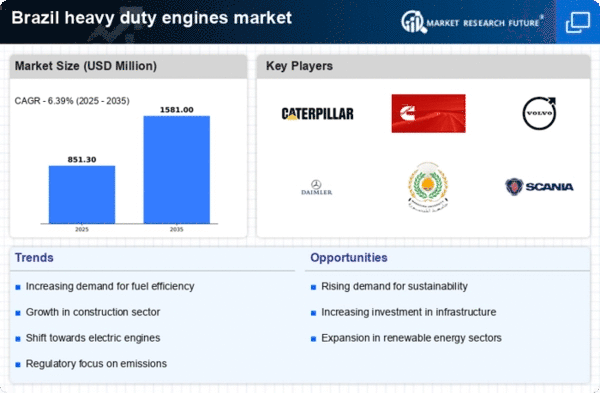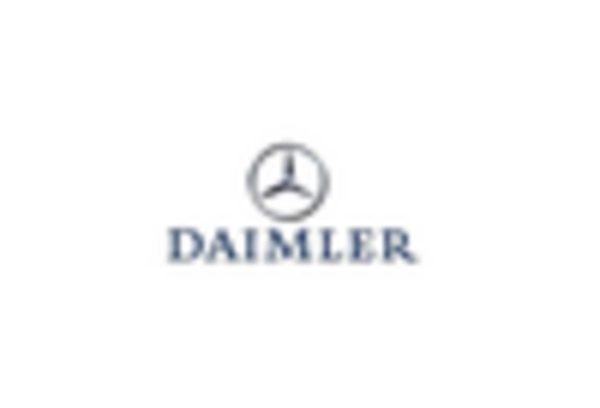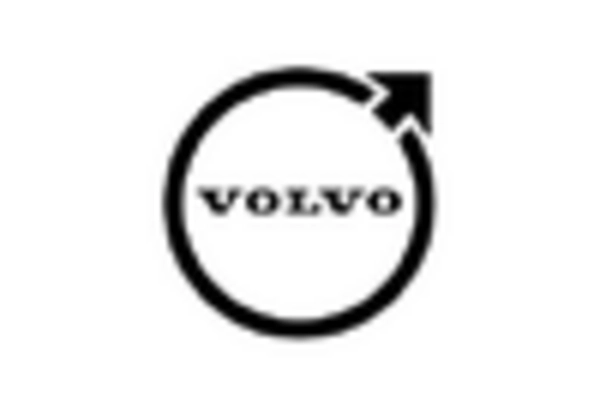Regulatory Compliance
Regulatory compliance is becoming increasingly stringent in Brazil, particularly concerning emissions and fuel efficiency standards. The Brazilian government has implemented regulations that require heavy duty vehicles to meet specific environmental standards, which in turn influences the heavy duty-engines market. As of 2025, it is estimated that around 30% of heavy duty engines sold must comply with the latest emissions standards. This regulatory landscape compels manufacturers to innovate and develop engines that are not only powerful but also environmentally friendly. Consequently, the heavy duty-engines market is likely to witness a shift towards cleaner technologies, which may involve significant investments in research and development. This trend could lead to a more competitive market, as companies strive to meet compliance while maintaining performance.
Infrastructure Development
The ongoing infrastructure development in Brazil plays a crucial role in the heavy duty-engines market. With the government investing heavily in transportation networks, including roads, railways, and ports, the demand for heavy duty engines is likely to increase. In 2025, the Brazilian government allocated approximately $10 billion for infrastructure projects, which is expected to boost the construction and logistics sectors. This surge in infrastructure projects necessitates the use of heavy duty vehicles, thereby driving the demand for heavy duty engines. Furthermore, the expansion of urban areas and the need for efficient freight transport are likely to further enhance the market dynamics. As a result, the heavy duty-engines market is poised for growth, supported by these infrastructural advancements.
Rising Demand for Logistics Services
The rising demand for logistics services in Brazil is a pivotal driver for the heavy duty-engines market. As e-commerce continues to expand, the need for efficient transportation solutions becomes paramount. In 2025, the logistics sector is projected to grow by approximately 15%, necessitating a robust fleet of heavy duty vehicles equipped with advanced engines. This growth is driven by the increasing consumer preference for fast delivery services, which places pressure on logistics companies to enhance their operational efficiency. Consequently, the heavy duty-engines market is likely to benefit from this trend, as companies invest in modernizing their fleets to meet the growing demand. The interplay between logistics growth and engine performance will be critical in shaping the future landscape of the market.
Economic Growth and Industrialization
Brazil's economic growth and industrialization are significant factors influencing the heavy duty-engines market. As the economy expands, there is a corresponding increase in industrial activities, which often require heavy machinery and vehicles. In 2025, Brazil's GDP is expected to grow by around 3%, fostering a favorable environment for industries such as construction, mining, and agriculture. These sectors are heavily reliant on heavy duty engines for their operations. The heavy duty-engines market is likely to see a surge in demand as industries seek to enhance productivity and efficiency. Additionally, the growth of the manufacturing sector may lead to increased investments in heavy duty vehicles, further propelling the market forward.
Technological Integration in Fleet Management
The integration of advanced technologies in fleet management is emerging as a key driver for the heavy duty-engines market. In Brazil, companies are increasingly adopting telematics and data analytics to optimize their fleet operations. This trend is expected to enhance the performance and efficiency of heavy duty engines, as real-time data allows for better maintenance and fuel management. By 2025, it is anticipated that around 40% of heavy duty vehicles will be equipped with telematics systems. This technological shift not only improves operational efficiency but also contributes to reduced operational costs. As a result, the heavy duty-engines market is likely to experience growth, driven by the demand for smarter, more efficient engines that align with modern fleet management practices.
















